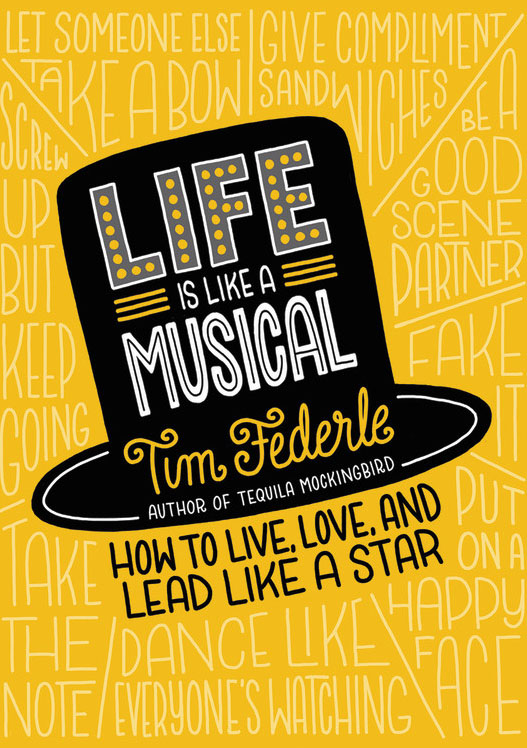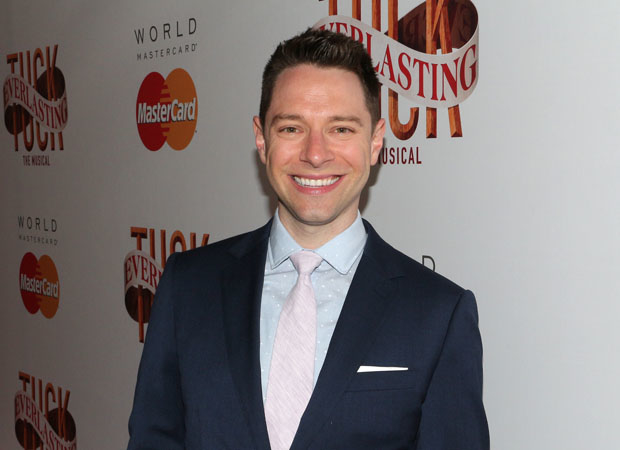EXCLUSIVE: A Special Chapter From Tim Federle's New Book Life Is Like a Musical
Before Tim Federle became the author of the bestselling Nate book series and the colibrettist of the musical Tuck Everlasting, he was a Broadway chorus boy. Now, Federle has taken the lessons he's learned performing in shows like Gypsy with Bernadette Peters and the Radio City Christmas Spectacular and spun them into a self-help book for musical-theater geeks: Life Is Like a Musical: How to Live, Love, and Lead Like a Star.
In celebration of the book's release, Federle has gifted TheaterMania with the chapter titled "Reconnect With Your Inner Theater Kid." You can read it below.

(photo provided by Running Press)
Our childhoods were probably pretty different. Maybe bliss, for you, did not involve blasting the Evita cast album (don’t call it a soundtrack) while acting out the title role, despite your not being Argentinian, or female, or a dictator. Regardless, I'm willing to bet that you had some activity that kept you occupied hour after hour when you were around eight years old. And I'd bet even more that you’ve lost touch with that thing. That spark. That obsession. Here’s the good news: That "theater kid" still lives inside you — you just have to access him again.
I'm not choosing the age eight arbitrarily. There was a study done stating that the person you were in about second grade — her quirky pastimes and fantasies for the future — was a strong indicator of who you were genuinely meant to be, once you got a couple feet taller. For a lot of us, it was the age when our daydreams went from generic ("I'd like to be playing hopscotch on the playground right now") to specific ("I’d like to play Belle in Beauty and the Beast on Broadway before I'm twenty").
But for too many of us, these elementary school years were also a time when others started raising an eyebrow at our youthful passions. And thus, by third grade, we began living our lives for the adults around us. That’s a hard habit to break—especially when you grew up getting a gold sticker for being "good," even at stuff you didn’t care much for. Being good is the opposite of being brilliant. I’d rather get a red X any day.
A lot of people say they got into theater because it offered an escape, a chance to at last be somebody else. I got into the theater because it was the one place I could actually be myself, warts and wigs and all. Your own inner theater kid — whoever that kid was — is a north star back toward a place in your life where you got lost in your imagination.
What made time stand still for you? Who were you, back when no one was looking? These questions are not rhetorical. They are, in fact, a directive. A clarion call to get back in touch with an authentic part of yourself.
For me to reliably get into a "flow," it was a toss-up between staging complicated routines in my parents' basement or working on my childhood comic strip, which I called "The Weird Way" (my own take on "The Far Side"). At some point, I guarantee you an adult informed me I had to pick one — be a choreographer or be a cartoonist. Worse, I was probably told I should pick a more practical adult ambition (as if there’s anything particularly practical about slaving away in a cubicle for forty years).
But you don’t have to pick a single major in life, and your inner kid knew that from the start. Your inner kid was likely dead set on growing up to be a professional, like, veterinarian-astronaut-lawyer-hula-hooper, back when she didn’t know "better." Go back and find some of that mad scientist sparkle you had before you started editing yourself. Or, rather, before an adult taught you to sand down your most interesting edges.
Because I write theater-themed novels for children, sometimes I have the joy of popping into a school for the day as its guest author, and signing a lot of books. I like to have a dialogue with the kids, above anything else. Invariably, when I ask a class of second graders, "Who here considers themselves a writer?" every last hand pops up. It’s adorable. It's true, too — second graders can spin a yarn, man. But when I'm touring with my novel for teens, and I ask the same question, basically…no hands go up. By senior year in high school, we've all been so beaten over the head with the supposed merits of topic sentences and the proper usage of semicolons that we've forgotten how to tell an actual story. But every second graders knows how to — they just start spouting. The more rules we pile onto ourselves, the less of a chance we have at striking true inspiration. It’s hard to innovate when you’re so busy being polite.
If you find yourself trying to figure out what kind of adult you should be, think back to what your younger self paid attention to. There's wisdom in who you were, back before you knew you had to be somebody.

(© David Gordon)
Reprinted with permission from Life Is Like a Musical © 2017 by Tim Federle, Running Press










